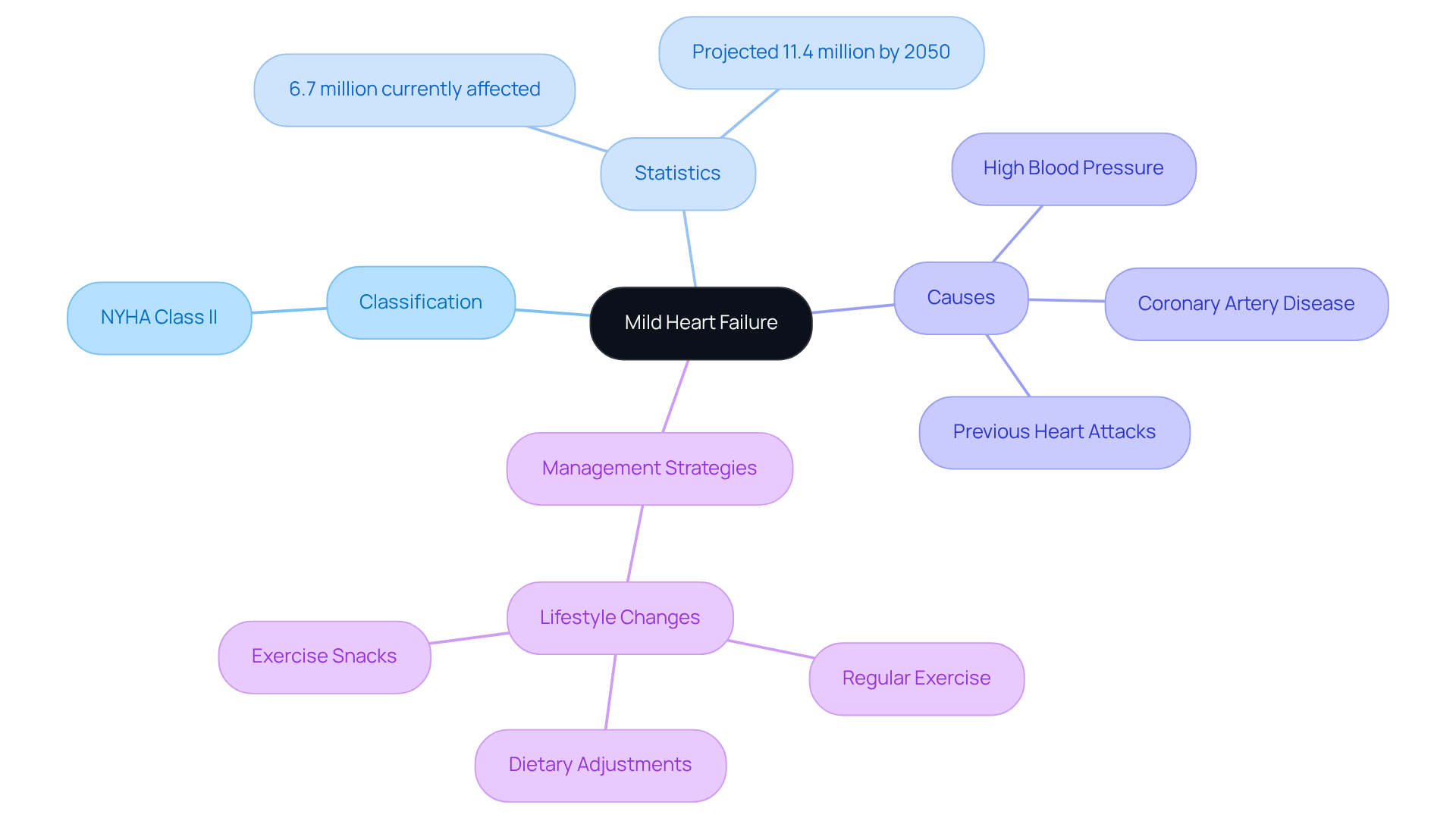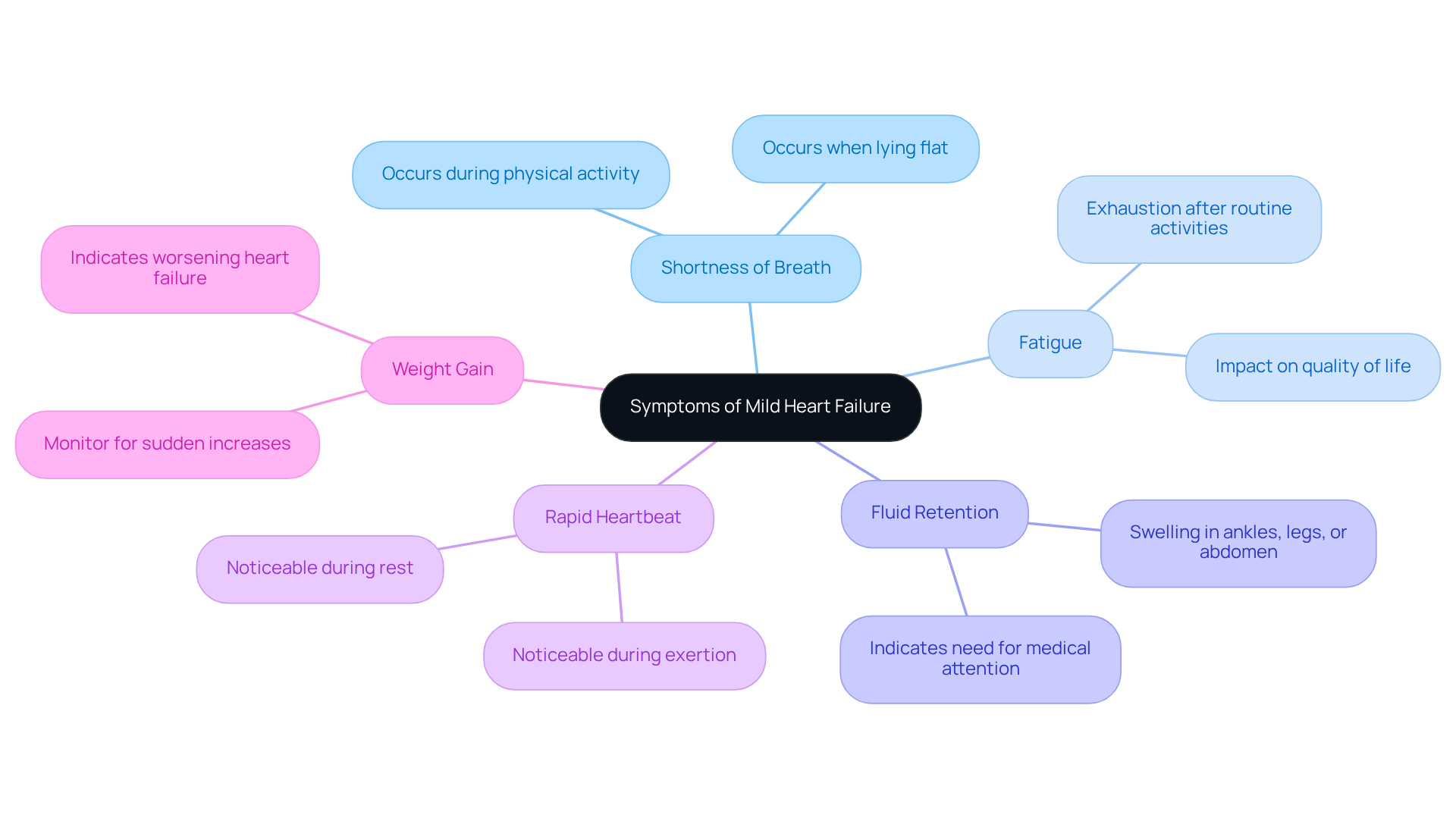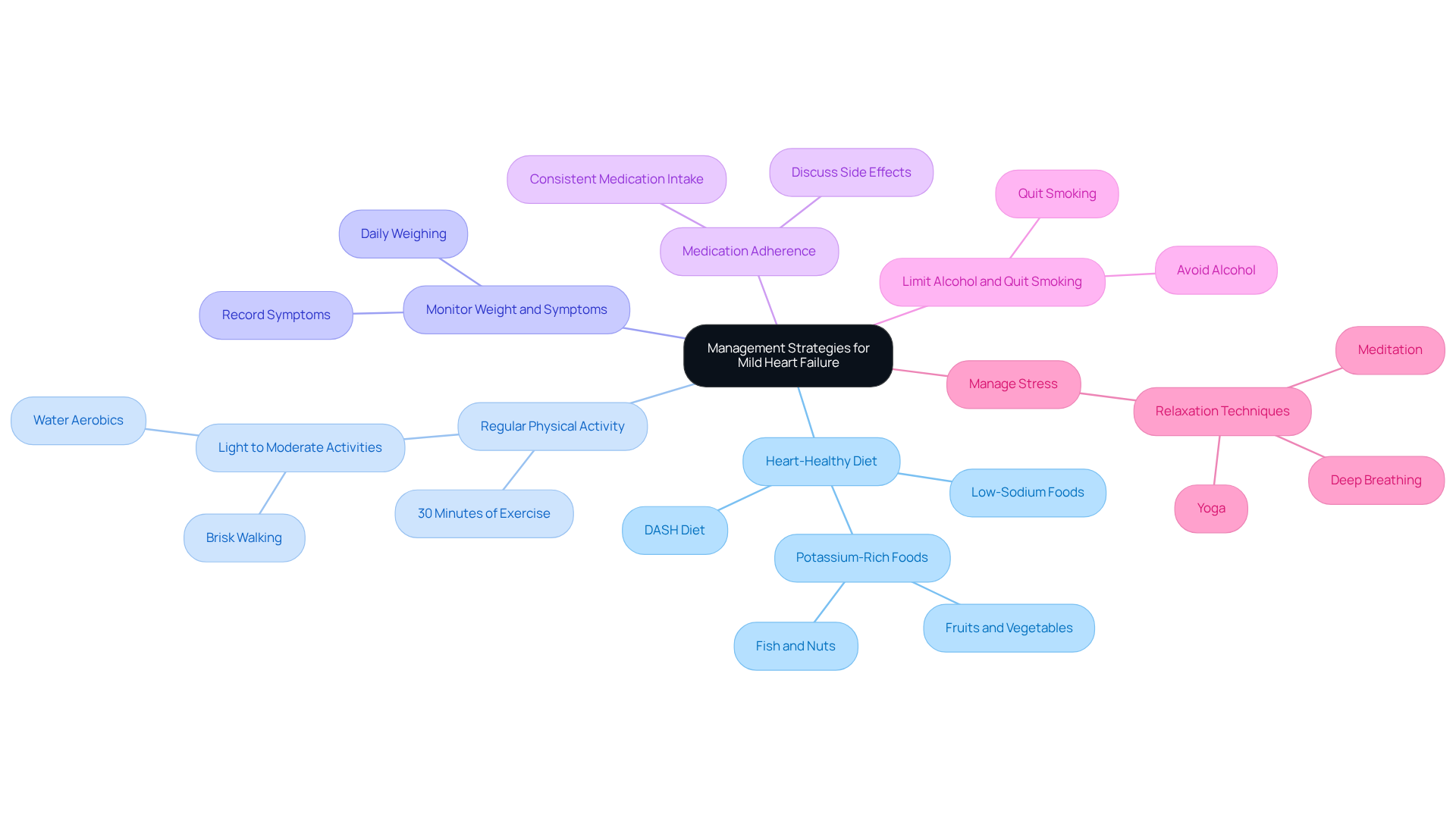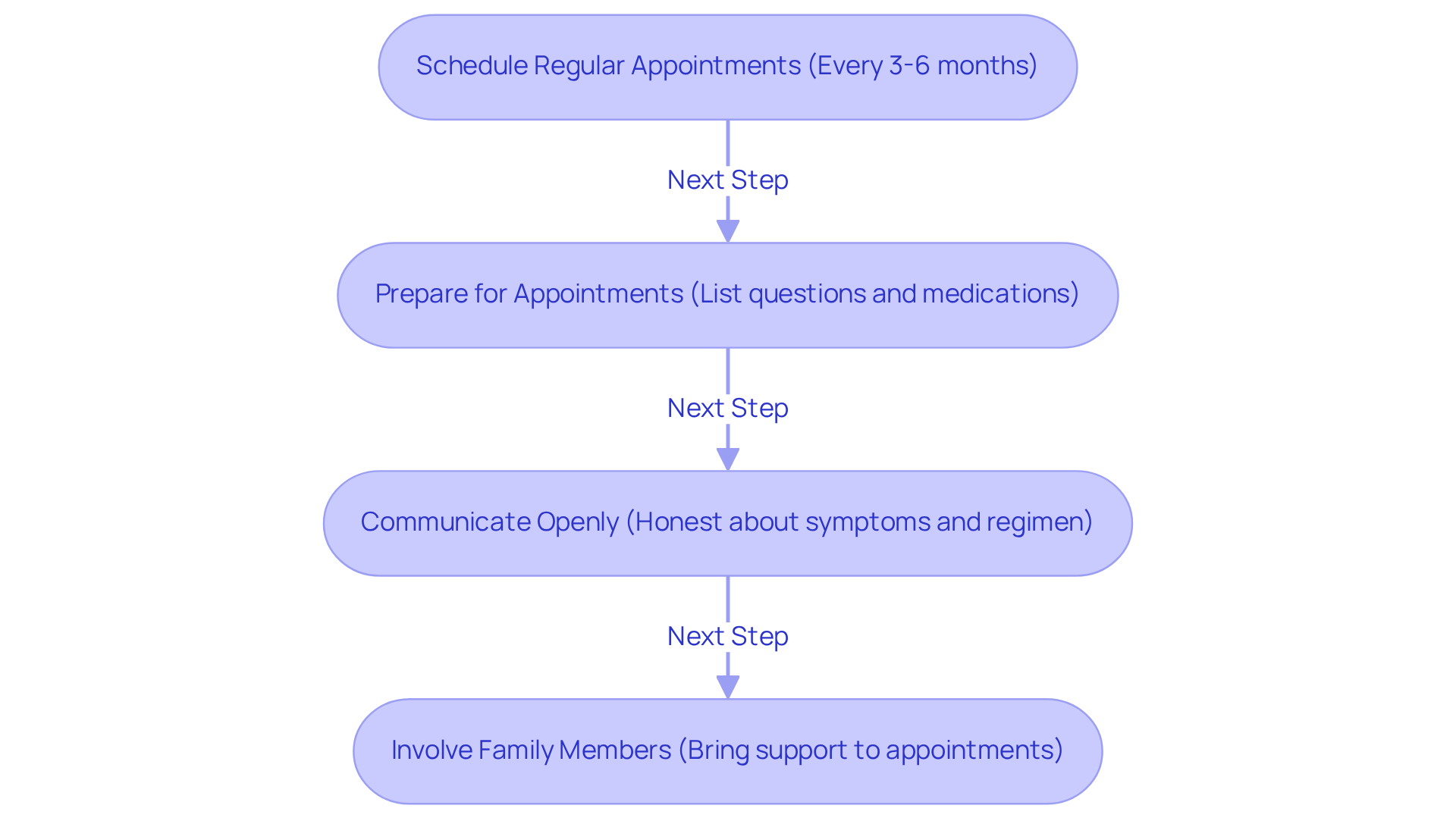


Managing mild heart failure can feel overwhelming, especially for elderly patients. However, there are key steps that can help you take control of your health and improve your quality of life:
These steps not only aim to enhance your health outcomes but also promote a proactive approach to your well-being. By focusing on these strategies, you can foster open communication with your healthcare team, ensuring that your concerns are heard and addressed. Remember, you are not alone in this journey; support is available.
In addition to these actions, it's essential to reflect on how you feel and reach out for help when needed. Your health matters, and taking these steps can lead to a more fulfilling life. Embrace this opportunity to prioritize your heart health, knowing that your efforts will lead to positive changes and a better quality of life.
Mild heart failure, often overlooked, affects millions of individuals, particularly among the elderly. Understanding its nuances is crucial for effective management. This condition, characterized by slight heart weakening, can still allow for a good quality of life when approached with the right strategies. However, the challenge lies in recognizing the symptoms early and implementing lifestyle changes that can significantly improve health outcomes. How can elderly patients navigate this complex landscape to ensure they thrive despite their diagnosis?
In addition to this, it's important to consider that many patients may feel anxious or uncertain about their health. By fostering an understanding of mild heart failure, we can empower individuals to take proactive steps towards their well-being. Simple lifestyle adjustments, such as:
can make a significant difference. Furthermore, connecting with healthcare professionals who specialize in heart health can provide the necessary support and guidance.
Ultimately, the journey towards managing mild heart failure does not have to be faced alone. With the right strategies and support, elderly patients can navigate this condition and enjoy a fulfilling life. Remember, reaching out for help is a sign of strength, and there are resources available to assist you every step of the way.
Mild heart failure, classified as New York Heart Association (NYHA) Class II, indicates a slight weakening of the heart, which allows it to function with minimal limitations. You may notice mild symptoms during physical activity, but generally, you should feel comfortable at rest. Understanding mild heart failure is crucial, as it emphasizes that while the heart's pumping capacity is affected, many individuals can maintain a good quality of life through appropriate management.
Recent studies reveal that around 6.7 million Americans over the age of 20 currently face cardiovascular issues, with projections suggesting this number could rise to 11.4 million by 2050. The causes of mild heart failure often include:
Recognizing these factors empowers you and your caregivers to make informed decisions about lifestyle changes and treatment options.
Cardiologists emphasize the importance of lifestyle changes, such as regular exercise and dietary adjustments, which can significantly improve outcomes for those with mild heart failure. For instance, engaging in short bursts of exercise, known as 'exercise snacks,' can enhance endurance and overall cardiovascular health without the need for lengthy workout sessions.
By understanding mild heart failure and its implications, you can take proactive steps in your care, ensuring you remain informed and engaged in your health journey. Remember, you are not alone in this; support is available to help you thrive.

Common symptoms of mild heart failure can be concerning, particularly for our elderly patients. Understanding these symptoms is essential for managing your heart health effectively. Here are some key signs to watch for:
To manage these symptoms effectively, we encourage you to maintain a symptom diary. This diary should include details about your shortness of breath, fatigue levels, swelling, pulse rate, and weight fluctuations. Regularly reviewing this information with your healthcare provider can facilitate prompt adjustments to your treatment plan, ultimately enhancing your health outcomes. Recognizing these indicators early is crucial, as they can significantly influence the management of mild heart failure in older individuals.
It’s important to remember that nearly 6.7 million adults aged 20 years and older in the United States experience cardiac dysfunction, highlighting the prevalence of this condition. Engaging in daily physical activity is also encouraged to help manage your symptoms effectively. Routine examinations with medical professionals are vital for ongoing support in managing your heart health. Additionally, please be aware that confusion and impaired thinking can arise from changing blood substance levels, further emphasizing the importance of proactive monitoring and open communication with your healthcare team.

Managing mild heart failure may seem overwhelming, yet there are effective strategies that can assist you in feeling better and living healthier. Here are some caring suggestions to consider:
Adopt a Heart-Healthy Diet: It’s important to prioritize a low-sodium diet to help minimize fluid retention. Focus on enjoying a variety of fruits, vegetables, whole grains, and lean proteins, while steering clear of processed foods. The DASH diet, recognized as the number one heart-healthy diet in 2025, supports these recommendations. Additionally, a potassium-rich diet can lower the risk of cardiovascular issues, hospitalization, and even mortality by 24%. This is essential for maintaining overall cardiovascular function.
Regular Physical Activity: Engaging in light to moderate exercise, like brisk walking or water aerobics, for at least 30 minutes most days can be very beneficial. Regular physical activity is crucial; research shows that even light exercise can significantly enhance cardiovascular health outcomes. Always consult with your healthcare provider before starting any new exercise regimen to ensure it’s safe and effective for you.
Monitor Weight and Symptoms: Weighing yourself daily at the same time can help you detect sudden weight gain, which may indicate fluid retention. Keeping a record of any new or worsening symptoms can assist in managing your health and facilitate communication with your healthcare providers.
Medication Adherence: It’s vital to consistently take your prescribed medications and understand their purpose. If you experience any side effects, discussing them with your healthcare provider can help ensure optimal management of your condition.
Limit Alcohol and Quit Smoking: Both alcohol and smoking can worsen symptoms of cardiac issues. Avoiding these substances is a key step in preserving your cardiovascular health.
Manage Stress: Incorporating relaxation techniques such as deep breathing, meditation, or yoga into your daily routine can effectively help manage stress levels. Remember, consistent exercise not only boosts physical wellness but also enhances mental health, which is particularly important for older individuals dealing with cardiac issues.
By incorporating these strategies, you can work towards better health outcomes, particularly in managing mild heart failure, and an improved quality of life. Remember, you are not alone on this journey, and seeking support can make a significant difference.

To effectively manage mild heart failure, it is essential to approach care with understanding and support. Here are some key steps to consider:
Schedule Regular Appointments: Aim for check-ups every 3 to 6 months, or more frequently if you notice any changes in your symptoms. These visits offer a valuable opportunity for healthcare providers to assess your heart function and adjust medications as needed. At Amavita Heart and Vascular Health, we focus on comprehensive cardiac evaluations using advanced imaging techniques to ensure precise diagnosis and effective management. Research shows that regular follow-up appointments after discharge are linked to lower 30-day readmission rates, highlighting their importance in your ongoing care.
Prepare for Appointments: Before your visits, take a moment to write down any questions or concerns you may have. Bringing a list of your medications, including dosages, and noting any recent changes in your conditions or lifestyle can greatly enhance communication. This preparation not only helps you feel more at ease but also ensures that all relevant issues are addressed during your appointment. The interactive workbook titled 'Living With Heart Failure Guide' can be a valuable resource to assist you in this process.
Communicate Openly: It’s important to be honest about your symptoms, how well you’re following your medication regimen, and any lifestyle changes. Open communication with your healthcare providers is vital for developing personalized management strategies that work for you. Studies indicate that patients who engage in open discussions with their care teams often experience better treatment outcomes.
Involve Family Members: Consider inviting family members to join you during your appointments. Their presence can provide support and help you better understand treatment plans and recommendations. Having a trusted person by your side can enhance communication and ensure that important information is not overlooked.
By taking these steps, you are actively participating in your health journey, and remember, you are not alone. We are here to support you every step of the way.

Understanding and managing mild heart failure is crucial for enhancing the quality of life for our elderly patients. By recognizing the implications of this condition, individuals can take proactive steps to safeguard their health and well-being. The journey toward effective management begins with awareness of symptoms, embracing lifestyle changes, and acknowledging the importance of regular check-ups. Together, these elements empower patients to navigate their heart health with confidence.
Key insights from this guide highlight the multifaceted approach necessary for managing mild heart failure:
Each strategy plays a vital role in improving cardiovascular health. Furthermore, the importance of monitoring symptoms and adhering to prescribed treatments cannot be overstated, as these practices lead to better health outcomes and a more fulfilling life.
Ultimately, managing mild heart failure transcends merely addressing medical concerns; it is about cultivating a supportive environment that encourages proactive health management. By embracing these strategies and seeking support from healthcare professionals and loved ones, elderly patients can take charge of their heart health, ensuring they lead a vibrant and active life despite the challenges posed by this condition. Remember, you are not alone on this journey; support is always within reach.
What is mild heart failure?
Mild heart failure, classified as New York Heart Association (NYHA) Class II, indicates a slight weakening of the heart, allowing it to function with minimal limitations. Individuals may experience mild symptoms during physical activity but generally feel comfortable at rest.
How common is mild heart failure in the United States?
Approximately 6.7 million Americans over the age of 20 currently face cardiovascular issues, with projections suggesting this number could rise to 11.4 million by 2050.
What are the common causes of mild heart failure?
Common causes of mild heart failure include high blood pressure, coronary artery disease, and previous heart attacks.
How can lifestyle changes impact mild heart failure?
Lifestyle changes, such as regular exercise and dietary adjustments, can significantly improve outcomes for those with mild heart failure. Engaging in short bursts of exercise, known as 'exercise snacks,' can enhance endurance and overall cardiovascular health.
What steps can individuals with mild heart failure take to manage their condition?
Individuals can take proactive steps in their care by understanding mild heart failure and its implications, making informed lifestyle changes, and engaging in their health journey with the support available to them.